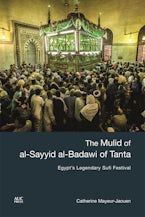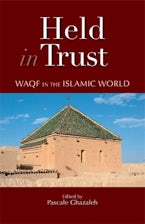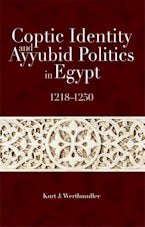- Home
- Jihad of the Pen

Jihad of the Pen
The Sufi Literature of West Africa
by Rudolph Ware, Zachary Wright and Amir Syed
320 Pages, 6.00 x 9.00 in
- Hardback
- 9789774168635
- December 2018
- Region: Worldwide
LE700.00
$59.95
£45.00
- EPUB
- 9781617978722
- December 2018
- Region: Worldwide
$58.99
- 9781617978739
- December 2018
- Region: Worldwide
$58.99
Where To Buy:
A richly annotated survey of writings by four of West Africa's most renowned Sufi scholars
Outsiders have long observed the contours of the flourishing scholarly traditions of African Muslim societies, but the most renowned voices of West African Sufism have rarely been heard outside of their respective constituencies. This volume brings together writings by Uthman b. Fudi (d. 1817, Nigeria), Umar Tal (d. 1864, Mali), Ahmad Bamba (d. 1927, Senegal), and Ibrahim Niasse (d. 1975, Senegal), who, between them, founded the largest Muslim communities in African history.
Jihad of the Pen offers translations of Arabic source material that proved formative to the constitution of a veritable Islamic revival sweeping West Africa in the nineteenth and twentieth centuries. Recurring themes shared by these scholars—etiquette on the spiritual path, love for the Prophet Muhammad, and divine knowledge—demonstrate a shared, vibrant scholarly heritage in West Africa that drew on the classics of global Islamic learning, but also made its own contributions to Islamic intellectual history. The authors have selected enduringly relevant primary sources and richly contextualized them within broader currents of Islamic scholarship on the African continent.
Students of Islam or Africa, especially those interested in learning more of the profound contributions of African Muslim scholars, will find this work an essential reference for the university classroom or personal library.
Acknowledgments
Note on Translation
Introduction: Zachary Wright
Four Saintly Biographies
Islamic Intellectual Production in West Africa
Islamic Law in West Africa
Philosophy and Metaphysics
Women Scholars of West Africa
Structure of the Book
Shaykh ʿUthman b. Fudi: Rudolph Ware, with translations by Aisha Bewley and Muhammad Shareef
Roots of the Religion (Kitab usul al-din)
Sciences of Behavior (ʿUlūm al-muʿamala)
Book of Distinction (Kitab al-tafriqa)
Shaykh ʿUmar al-Futi Tal: Amir Syed
Reminder for the Seekers (Tadhkirat al-mustarshidin)
Lances of the Party of the Merciful (Rimah hizb al-Rahim)
Vessel of Happiness (Safinat al-saʿada)
Shaykh Aḥmad Bamba Mbacké: Rudolph Ware
The Valiant One (al-Sandid)
Pathways to Paradise (Manasalik al-jinan)
Gifts of the Benefactor (Mawahib al-Nafiʿ)
Shaykh Ibrahim ʿAbdallah Niasse: Zachary Wright
The Spirit of Etiquette (Ruh al-adab)
The Removal of Confusion (Kashif al-ilbas)
The Jeweled Letters (Jawahir al-rasaʾil)
Poetry for the Prophet (from Diwawin al-sitt)
Conclusion: Rudolph Ware
Rudolph Ware is associate professor in the department of history at the University of Michigan, and the founder and director of the IKHLAS research initiative for the study of Islamic Knowledge, Histories and Languages, Arts and Sciences. He is the author of The Walking Qur’an: Islamic Education, Embodied Knowledge, and History in West Africa (2014) and several articles on slavery in Islamic Africa and the Atlantic World.
Zachary Wright is associate professor of history and religious studies at Northwestern University in Qatar. His research concerns Islamic revivalism and the religious sciences, especially Sufism, in North and West Africa from the eighteenth to the twentieth centuries. He is the author of Living Knowledge in West African Islam: The Sufi Community of Ibrahim Niasse (2015).
Amir Syed is a visiting assistant professor of the history of the Islamic world at the University of Pittsburgh. His research interests include issues related to the construction of religious authority, scholarly culture, and Islamic knowledge practices.
"[A]n excellent source of reading matter for scholars of Islam in Africa, students of Islamic studies, Sufism, and African studies. . . . an essential reference for the university classroom or personal library."—Journal of Islamic Studies
"A valuable contribution to scholarship and teaching . . . enthusiastically recommended."—Journal of African History











